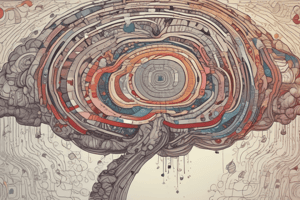Podcast
Questions and Answers
Sensory information is stored in the brain for a ______ amount of time.
Sensory information is stored in the brain for a ______ amount of time.
brief
The Three-Stage Model of Memory includes the stages of ______, Storage, and Retrieval.
The Three-Stage Model of Memory includes the stages of ______, Storage, and Retrieval.
Encoding
The process of transferring information from Short-Term Memory to Long-Term Memory is called ______.
The process of transferring information from Short-Term Memory to Long-Term Memory is called ______.
Consolidation
The ______ Theory suggests that information is lost over time due to non-use.
The ______ Theory suggests that information is lost over time due to non-use.
The tendency to remember information that confirms existing beliefs is known as ______.
The tendency to remember information that confirms existing beliefs is known as ______.
The Levels of Processing Model includes both ______ and Deep Processing.
The Levels of Processing Model includes both ______ and Deep Processing.
The process of creating a memory is called ______.
The process of creating a memory is called ______.
The availability ______ is a tendency to overestimate the importance of vivid memories.
The availability ______ is a tendency to overestimate the importance of vivid memories.
Unconscious forgetting of unpleasant memories is known as ______.
Unconscious forgetting of unpleasant memories is known as ______.
Flashcards
Sensory Memory Duration
Sensory Memory Duration
The initial stage where sensory information is briefly held.
Encoding
Encoding
The first stage, converting sensory input into a usable format.
Consolidation
Consolidation
Moving information from short-term to long-term memory.
Decay Theory
Decay Theory
Signup and view all the flashcards
Confirmation Bias
Confirmation Bias
Signup and view all the flashcards
Shallow Processing
Shallow Processing
Signup and view all the flashcards
Encoding
Encoding
Signup and view all the flashcards
Availability Heuristic
Availability Heuristic
Signup and view all the flashcards
Repression
Repression
Signup and view all the flashcards
Study Notes
Types of Memory
- Sensory Memory: brief storage of sensory information in the brain (e.g., visual, auditory)
- Short-Term Memory (STM): limited capacity, information held for a short time ( seconds to a minute)
- Long-Term Memory (LTM): permanent storage, capacity is relatively unlimited
Models of Memory
- Three-Stage Model:
- Encoding (information enters the system)
- Storage (information is retained)
- Retrieval (information is accessed)
- Levels of Processing Model:
- Shallow Processing (structural, surface-level processing)
- Deep Processing (semantic, meaningful processing)
Memory Processes
- Encoding: process of creating a memory
- Consolidation: process of transferring information from STM to LTM
- Retrieval: process of accessing stored information
- Forgetting: loss of information over time
Types of Forgetting
- Decay Theory: information is lost over time due to non-use
- Interference Theory: new information interferes with existing information
- Repression: unconscious forgetting of unpleasant memories
Memory Biases and Errors
- Confirmation Bias: tendency to remember information that confirms existing beliefs
- Hindsight Bias: tendency to overestimate the predictability of an event
- Availability Heuristic: tendency to overestimate the importance of vivid memories
- Misinformation Effect: incorporating false information into memories
Studying That Suits You
Use AI to generate personalized quizzes and flashcards to suit your learning preferences.




